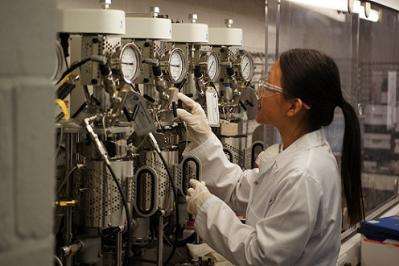Scientists discover gold's hidden value

(Phys.org) —Scientists from Cardiff are discovering new and unexpected uses for gold – a noble metal traditionally regarded as being chemically uninteresting due to its poor ability to react with other substances.
Researchers at the School of Chemistry are pioneering new ways to exploit the revolutionary potential of gold to accelerate and optimise chemical processes in a range of industries from producing the plastics that modern life depends on to environmentally friendly energy production. Studies show that the main advantages of gold as a catalyst are its long lifetime, unusually high reactivity and high specificity to the desired product.
"Gold has been a subject of human fascination for millennia, largely because of its resistance to corrosion and its resulting sustained beauty," said Professor Graham Hutchings, FRS Director of the Cardiff Catalysis Institute (CCI). "However, when broken down into nanoparticles, which contain just a few hundred atoms, it not only changes colour; it also becomes incredibly reactive, so contrary to the old adage; not even all that is gold glitters. Our research into the effect of gold nanoparticles on chemical and biological processes shows that in its nanoparticle form, gold's reactions are faster, easier and energetically more efficient than many other catalysts."
Catalysis is an enabling technology that underpins an estimated 80-90% of all manufactured goods. The phenomenon involves a material, which is not one of the reactants, speeding up a desired chemical reaction without the need for an increase in temperature. Commonly used catalysts such as those containing mercury have proven wasteful, environmentally hazardous and even harmful to human health. Gold, scientists have discovered, is not only a viable alternative catalyst but sometimes, the best possible catalyst.
Professor Hutchings believes that gold has the potential to save lives, improve human health and clean up the environment: "Too many processes create too much waste and not enough product. By introducing a gold catalyst we can reduce the amount of waste and increase the productivity for the benefit of a number of processes. The more we learn about this precious metal, the more I feel that society is ascribing the wrong kind of value to gold."
He adds: "One of the initial discoveries we made is that gold is the best catalyst for the formation of vinyl chloride, the main ingredient for the production of PVC and has the potential to replace an environmentally harmful mercury catalyst, this would be a major benefit to society. Gold is also used as a catalyst to oxidise carbon monoxide to carbon dioxide. This has potential to be used in natural disasters where people are trapped in an enclosed space, such as mine shafts, and poisonous carbon monoxide (CO) needs to be removed from the air - but also in domestic settings where people live alongside equipment that has a risk of CO production from incomplete combustion e.g. gas heaters, cookers, petrol engines."
Catalysts are under continual development to achieve new levels of activity and selectivity to society's desired chemical products. Using gold in catalysis could enable society to make better use of precious raw materials and to exploit new, greener sources by generating fuels, plastics and other chemicals from renewables such as corn starch, glycerol and recycled waste. Smarter use of catalysis will also lower our energy consumption and help in the decentralisation of activities such as water purification and small scale electrical power generation.
Research at Cardiff Catalysis Institute (CCI) is currently exploring the possibility of using gold as a "cold start" catalyst in car exhaust systems to reduce carbon emissions. The current catalysts depend on the heat of the exhaust to become active. This means that the first few minutes of any journey produce the most emissions of CO and NOx. As gold can work at lower temperature than conventional catalysts, it could be used in this early stage.
Provided by Cardiff University





















